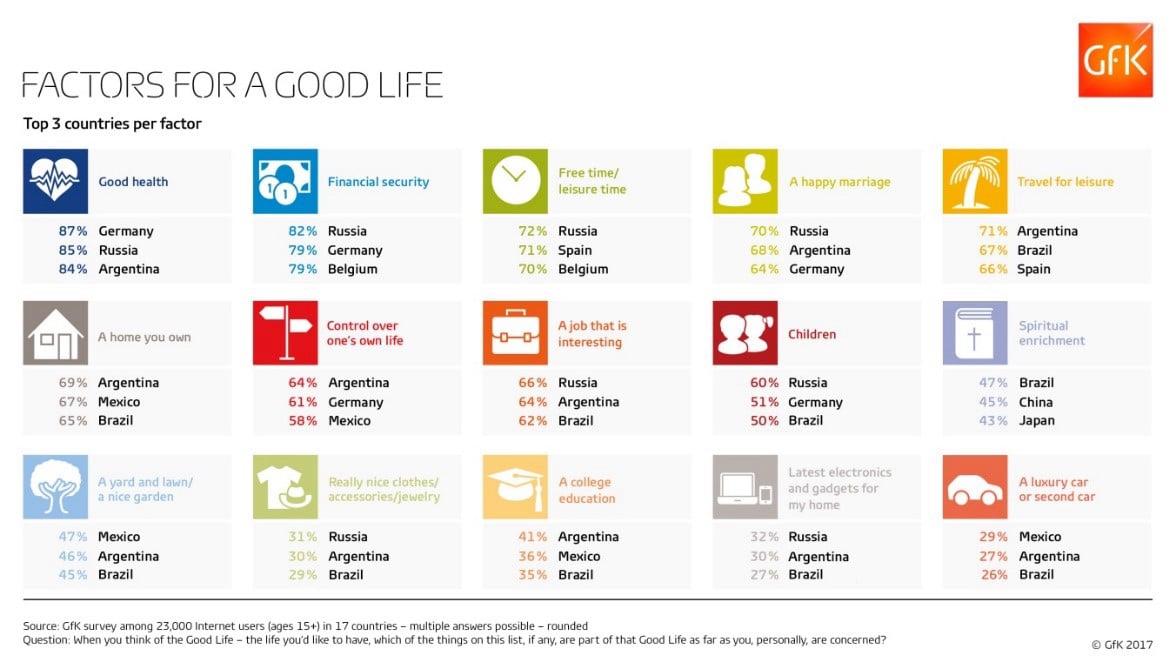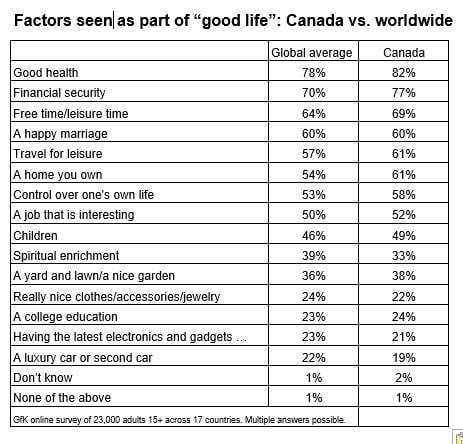In GfK study, half say children are factor, while just one-quarter cite college education
The market insight experts at GfK asked 23,000 consumers online in 17 countries which factors would be part of the life they would like to have – the often-elusive “good life.” Respondents chose from 15 possible elements.
In Canada, “good health” was selected by eight out of ten (82%) of respondents – slightly higher than the global average (78%). (See table below.) Over three-quarters (77%) of Canadians cited “financial security” – substantially above the global figure (70%). And over two-thirds (69%) in Canada picked “free time/leisure time,” versus 64% worldwide.
Scoring surprisingly low, in Canada and globally, are answers such as
- • children – 49% in Canada; 46% global average
• college education – 24% in Canada; 23% global average
• spiritual enrichment – 33% in Canada; 39% global average
Younger age groups more likely to prioritize college
College education has greater “good life” resonance with younger people than older ones, in Canada and worldwide. Almost four in ten (37%) Canadian teenagers picked college as a good life factor, compared to 29% globally. The figure drops to 25% of Canadians in the 20-to-29 and 30-to-39 age groups, and 21% or 22% for older Canadian consumers.
This trend of lessening popularity within older groups of Canadians is also generally seen for other “good life” factors, including “really nice clothes, accessories or jewelry”; “having the latest electronics or gadgets”; and “having a luxury or second car.”
In direct contrast, “good health,” “financial security,” and “control over one’s own life” are usually more popular among older age groups – Canadian and global – than younger ones. Almost 9 in 10 (89%) Canadians aged 60 or above cited health as a top good life factor, and 85% in this age group chose financial security – almost 10% above the next highest cohort.
Argentinians lead in seeing travelling for leisure as part of the good life
People in Argentina (71%) are most likely to cite travelling for leisure as part of the good life, followed by Brazilians (67%) and Spaniards (66%). Financial security, on the other hand, has most resonance with Russians (82%), followed by Germans and Belgians (both 79%).
To download the infographic in high-resolution, please click here.
Download GfK’s complimentary “Good Life factors” report to see key demographic data for each of the 17 countries included in this survey.
GfK combines these self-reported insights with data from areas such as point of sales tracking, consumer panels and geo-marketing to help clients identify and target high-potential audiences both globally and within specific countries.
About the study
The survey question asked, “When you think of the Good Life – the life you’d like to have – which of the things on this list, if any, are part of that Good Life as far as you, personally, are concerned?: A home you own; Good health; A happy marriage; A job that is interesting; Children; A yard and lawn/a nice garden; Free time/leisure time; Spiritual enrichment; A college education; Financial security; A luxury car or second car; Travel for leisure; Really nice clothes / accessories / jewelry; Having the latest electronics and gadgets for my home; Control over one’s own life; None of the above; Don’t know”
GfK interviewed 23,000 consumers online in 17 countries in the summer 2017. Data are weighted to reflect the demographic composition of the online population aged 15+ in each market. The global average given in this release is weighted, based on the size of each country proportional to the other countries.
Countries included are Argentina, Australia, Belgium, Brazil, Canada, China, France, Germany, Italy, Japan, Mexico, Netherlands, Russia, South Korea, Spain, UK and USA








